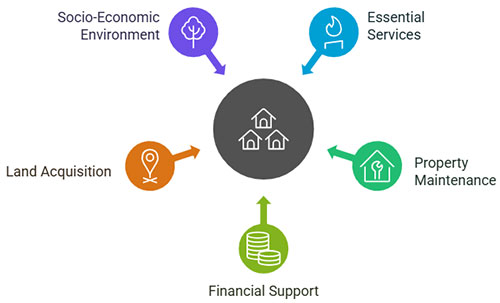What is a Housing Society? Types, Features, and How to Register in India
- 22nd Mar 2025
- 1206
- 0

Never miss any update
Join our WhatsApp Channel
Housing societies have been a popular housing option in India for decades. These cooperative communities offer affordable living spaces where members share costs and responsibilities. After COVID-19, the real estate market underwent significant changes, with the government introducing new schemes to make housing more accessible to urban residents.
What is a Housing Society?
A housing society is a unique form of property ownership where an organization holds the property title and sells shares to residents. The society develops the property, constructs buildings, and allocates units to its members. These societies operate through mutual understanding and are governed by various Cooperative Societies Acts.
Types of Housing Societies in India
1. Tenant Ownership Housing Cooperatives
In these societies, members own their houses while the land is held by the society on a freehold or leasehold basis. Members can build their homes according to their preferences but must follow regulations when transferring ownership or subletting.
2. Tenant Co-partnership Housing Cooperatives
Also called flat owner societies, these cooperatives hold both the land and buildings. Members gain occupancy rights after paying the required capital and monthly rent.
3. House Building Societies
These societies, also known as house construction societies, build houses for their members. Once construction is complete, the houses are handed over to members, and construction costs are recovered through loans.
4. Housing Mortgage Societies
Operating like credit societies, these housing cooperatives lend money to members for house construction. Members are responsible for arranging the construction themselves.
Key Features of Housing Societies
- Open Membership: Anyone can become a member regardless of background.
- Voluntary Participation: Members join willingly, following principles of self-help.
- Democratic Structure: Officials are elected through fair elections.
- Legal Status: Registered under the Cooperative Societies Act, making them legal entities.
- Equal Contribution: All members contribute equally to purchase and maintain common properties.
- Training Programs: Societies conduct training on legal compliance, community living, and management.
- Mutual Benefit: Members work together for everyone's welfare and prosperity.
Goals of Housing Societies
Housing societies aim to build communities where people live together like a family. Their main objectives include:
- Providing essential services like electricity and water
- Ensuring proper maintenance of the property
- Offering financial support through loans for construction
- Acquiring land, building flats, and distributing them to members
- Creating a healthy socio-economic environment

How to Form a Housing Society
Most housing societies in India operate under the National Cooperative Housing Federation of India. Their responsibilities are governed by model by-laws based on the Multi-State Cooperative Societies Act 2002. Other societies follow the Cooperative Society Act 1912 or state-specific Cooperative Society Acts.
Registration Process for Housing Societies
To register a housing society in India, follow these steps:
- Application Authorization: Hold a meeting with proposed members and elect a chief promoter.
- Name Application: Apply for a society name with at least 10 members' signatures.
- Registration Application: Include "Limited" as the last word for societies with limited liability.
- Bank Account Creation: Open a bank account and deposit the required capital.
- Additional Information: Provide any clarifications to the state registrar within the given timeframe.
- Certificate Issuance: Receive the incorporation certificate within two months after successful application.
- Appeal Process: If registration is denied, file an appeal within one month.
Documents Required for Registration
- Registration application form
- Bank account statements and certificates
- Application forms signed by at least 90% of promoter members
- Promoter member details
- Society working explanation
- Proposed by-laws copies
- Form D account statement
- Registration fee payment proof
- Title Clearance Certificate from an advocate
- Non-agricultural land certificate
- Land ceiling Act applicability order
- Approved construction layout
- Sanction letter
- Title search report
- Completion certificate
- Development Agreement (if needed)
- Power of Attorney for the land
- Stamp duty and registration charges documents
- Architect Certificate
- Society member details
- Guarantee letter for government land
- No objection certificates for Trust land
- Forms A, B, and C with society and member information

Benefits of Joining a Housing Society
1. Secure Investment
Housing societies provide safe investments as they are legal entities governed by laws. Without landlord interference, members can live in their units indefinitely or benefit from renting them out.
2. Affordability
Costs for services and amenities are divided among all members, making them more affordable than independent ownership. Housing societies typically offer pocket-friendly down payments, longer mortgage terms, and lower pre-closure charges.
3. Democratic Governance
Every member has equal rights and privileges as a shareholder. Society managers are elected through fair voting.
4. Better Amenities
Since members are often residents themselves, they take better care of the premises with a sense of ownership pride. They can voice opinions in a secure environment.
5. Shared Responsibility
Responsibilities like repairs, replacements, insurance, and maintenance are divided among members. All members share maintenance charges and overhead expenses equally.
Housing societies continue to gain popularity across India for their affordability, security, democratic structure, and quality amenities. As separate legal entities with their own means of sustenance, they offer a sustainable and community-oriented approach to housing.
Frequently Asked Questions
Who can become a member of a housing society?
Any person above 18 years with common interests can join a housing society.
What is the minimum number of members required to form a housing society?
At least ten members are required to register a housing society in India.
Can I sell my flat in a housing society?
Yes, you can sell your flat but must follow the society's regulations for transferring ownership.
Who handles the maintenance in a housing society?
The cooperative society is responsible for repairs, replacements, and maintenance, with costs shared by all members.
How are decisions made in a housing society?
Decisions are made democratically through general body meetings and voting by members.
Can I make changes to my flat in a housing society?
Yes, but you need to obtain permission from the society management before making significant structural changes.
What happens if a member doesn't pay maintenance fees?
Members who don't pay maintenance fees may face penalties or legal action as specified in the society's by-laws.
Is it possible to rent out my flat in a housing society?
Yes, you can rent out your flat, but you must inform the society management and follow their guidelines.

 Admin
Admin

Comments
No comments yet.
Add Your Comment
Thank you, for commenting !!
Your comment is under moderation...
Keep reading blogs